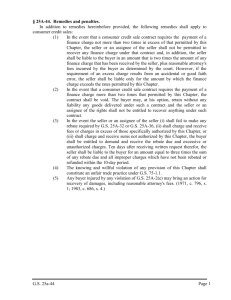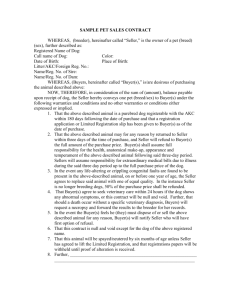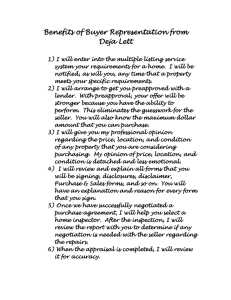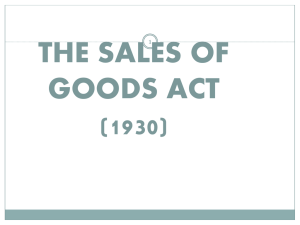BUL 301 Commercial Law I
advertisement
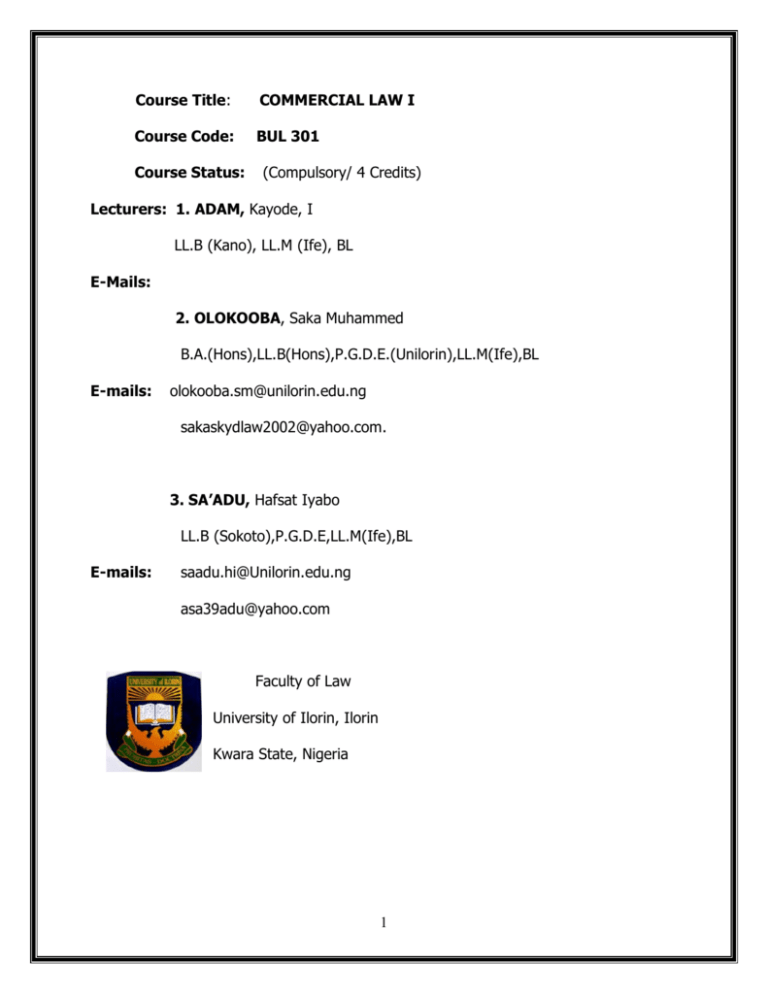
Course Title: COMMERCIAL LAW I Course Code: BUL 301 Course Status: (Compulsory/ 4 Credits) Lecturers: 1. ADAM, Kayode, I LL.B (Kano), LL.M (Ife), BL E-Mails: 2. OLOKOOBA, Saka Muhammed B.A.(Hons),LL.B(Hons),P.G.D.E.(Unilorin),LL.M(Ife),BL E-mails: olokooba.sm@unilorin.edu.ng sakaskydlaw2002@yahoo.com. 3. SA’ADU, Hafsat Iyabo LL.B (Sokoto),P.G.D.E,LL.M(Ife),BL E-mails: saadu.hi@Unilorin.edu.ng asa39adu@yahoo.com Faculty of Law University of Ilorin, Ilorin Kwara State, Nigeria 1 Office Location: * Room 214, Wing 1 (Old Complex), Faculty of Law ** Wing 2 (Old Complex), Faculty of Law *** Room 215, Wing 1 (Old Complex), Faculty of Law Consultation Hours: *Tuesday, 1p.m – 3pm **Wednesday, 12noon – 2pm Courseware prepared by: Dr K.I Adam, Mr. S.M.Olokooba and Mrs H.I. Saadu Course Contents: Sales of Goods – Definition of Sale of goods, Nature and Affirmation of the contract of sale of goods, Conditions, Warranties and Representations, Ownership and Passing of Property, Transfer of Risk, Duties of Seller and Buyer, Remedies for Breach and Frustration, Special Commercial Contracts in Outline Form. The Use of Various Payment Devices e.g. Cheques, Credit Cards, Luncheon and Fuel Vouchers. 60h (T), C. 2 Course Description: The course is designed to introduce students in the Faculty of Law to the Laws regulating commercial contracts in Nigeria. It lays emphasis on the provisions of Sale of Goods Act of 1893 and other related laws on commercial transactions and the incidences attached thereto. The law is critically looked into vis-àvis relevant cases that apply to various principles of commercial activities in Nigeria. This is done in order to enable the students to develop a more detailed and advanced understanding of commercial law in Nigeria. Method of Grading: NO. ITEMS SCORE % 1. Class Attendance 05 2. Class participation 05 3. Continuous Assessment 20 4. Semester Examination 70 5. Total 100 Course Justification So long as we have commerce, there is a need for commercial law. Therefore, there is an obligation to prepare our students for the commercial transaction and dispute that may arise naturally in our world of business. It is also imperative for student to develop 3 a more detailed and advanced knowledge and understanding of commercial the law that guides the commercial dealings in Nigeria. Consequently, students who take this course are taught to appreciate and have a deep understanding of the laws and practices regulating commercial transactions in Nigeria. Course Objectives: The general objective of the course as an integral part of the LL.B (Hons) programme is to know the requirements of law of commercial contracts in Nigeria. At the end of the semester, students are expected to: Identify laws regulating commercial law in Nigeria i.e the Sale of Goods Act of 1893 Appreciate the legal framework of commercial law in Nigeria Examine the relevant sections of the law relating to different aspects of commercial activities Understand the concept of conditions, warranties, mere representation e.t.c Appreciate the doctrine of nemo dat quod non habet and merchantability of goods. Understand the role of buyer and seller in commercial dealings and possible remedies in the event of breach by either of the parties. 4 Course Requirements: The subject is a compulsory course that must be passed by all the 300 levels students in the Faculty of Law. The course is to be taken in the 1st semester. Students are required to have 75% attendance to be able to write an examination on the course. Course Delivery Strategies: The mode of course delivery shall be interactive. Thus, a combination of face to face techniques shall be employed towards imparting knowledge on the student i.e Discussions, seminar presentations, tutorial and brief note taking. LECTURES WEEK 1: Definitions, Nature and Formation of the Contract of Sales of Goods Objective: At the end of week one, students are expected to be able to: Give working definitions of contract of sales 5 Explain and appreciate the nature of contract of sale of goods as contained under section 1 of the Sale of Goods Act of 1893. Explain the necessary formalities required for the making of a contract of sale of goods as stated in section 3 of the Act. Description: The topic will focus on the definitions given in the Sales of Goods Act on contract of sale, meaning of sales, formalities and requirement of a valid sale. Study Questions: 1. Going by the provision of section 1, sales of Goods Act, what can we classify as a contract of sale and the nature that such a contract should take? 2. Critically examine the circumstances when a sale can be said to be absolute or conditional. 3. Going by the provision of the Sales of Goods Act 1893, what are the formalities required for the making of contract of sale 4. List and discuss different classes of goods as outline in the Sales of Goods Act, 1893 Cases and Statute to be reviewed Sales of Goods Act 1893 Test of Merchantability as depicted in the case of Plastic Manufacturing Co. Ltd. V. Toki Nig. Ltd (1976) 12 CCHCJ 2701, 6 WEEK 2: Essential terms of Contract of Sale Objective: At the end of week two, students are expected to Know different essential terms in the contract of sale Appreciate the essence of the terms as far as the contract of sale is concerned. necessary terms which Be able to explain the legal requirement parties to the agreement of sale must fulfilled while entering into contract of sale. Description: The topic will focus on explanation of various essential terms of contract in the agreement of sale. Such terms are parties (buyer and seller), offer and acceptance, consent of the parties, capacity, price, time, goods e.t.c Study Questions: 1. With relevant authorities, explain the essential terms of contract of sales? 2. Distinguish between an offer and invitation to treat. 3. Explain the provision of section 2 of the Sales of Goods Act in relation to capacity to contract of sale. 4. supporting your answer with relevant authorities, discuss the legal effect of the failure to stipulate price in a sale? 7 Week 3: Rights and Duties of Parties, Examination of Terms that goes to the root of Contract of sale. Objective: At the end of week three, students are expected: To be able to explain the rights and duties of parties to the contract of sale of goods. Appreciate the terms of contract which may or may not allow the contract of sale to be repudiated; and Know what the law stipulates in case there is a collateral promise by one of the parties to a contract. Description: Examination of the duties of different parties to a contract of sale i.e paid and unpaid seller and buyers will be the focused here. Not only that, the topic will also focus the Acts which can lead to the repudiation of contract of sale and the Act that if breached will not give the parties the right to repudiate but to pay damages; all in accordance with Section 11 of the Sales of Goods Act. However, instances where a breach of condition may mean a breach of warranties will also be examined. Study Questions: 1. Distinguish between conditions and warranties. 2. Explain the instances where a breach of conditions will mean a breach of warranties 8 3. What is a mere representation? 4. Who is an unpaid seller? 5. Mention and discuss vividly, the available remedies at the disposal of an unpaid seller as against the buyer in the contract of sale of goods. WEEK 4: Title to contract of Sale – Section 12 Objective: At the end of week four, students are expected to: Explain the doctrine “nemo dat quod non habet” as it relates to the transfer of title from one party to another. Description: Section 12 of the Act states that the seller must have a good title to the goods before he can transfer same to the buyer and that is the whole essence of “nemo dat quod non habet”. Study Questions: 1. As outline in the Sales of Goods Act, critically examine how a party to the contract of sale can acquire a good title to sell 2. Explain the maxim “nemo dat quod not habet” as relates to the contract of sale 3. State and explain the exceptions to this maxim as contained in section 126 of the Act. 9 WEEK 5: Sale of Goods by Description – Section 13. Objective: At the end of week five, students are expected to: Be able to identify and understand when a particular good or goods complied with the descriptions of sale Description: Know the legal effect of non-compliance. What constitute compliance and non compliance as relates to the sales of goods by description before and after supply will be the zenith of discussion. Not only that, where the good is sold by sample and description, the position of the law as regard the breach by any party to the contract will also be examined. Study Questions: 1. Differentiate between sale of goods by sample and sales of goods by description. 2. Critically examine the gravity of any statement made by the seller as to description of the subject of sale? 3. State and explain the provisions of Section 13 of the Sales of goods Act as relates to sale by description. WEEK 6: Quality of Fitness of Goods or Property for the Particular Purpose – Section 14. Objective: At the end of week six, students are expected to: Understand the conditions under which property would fit the particular purpose for which it is purchased. 10 Be able to explain how merchantability can be determined going by section 14(2) sales of Goods Act and the exceptions thereto Description: The quality of fitness of good or property for the particular purpose for which it is required is central to the contract of sale of goods. Section 14 sub-section 2 talks about merchantability of quality and the exceptions to it. Study Questions: 1. State the position of law on the property which does not fit the particular purpose for which it is bought. 2. Discuss the doctrine of merchantability of quality and the exceptions thereto as outline in the Sales of Goods Act. WEEK 7: Sale by Sample – Section 15 Objective: At the end of week seven, students are expected to: To have deep knowledge on the requirements of the law as regard sales by sample. To be able to apply the appropriate law when dealing with sale by sample. 11 Description: Section 15 of the Act which states that in a contract of sale by sample, that there is an implied condition that the bulk shall correspond with the sample in quality and it should be free from any defect. Study Questions: 1. What is a sale by sample? 2. Explain the provision of section 15 of the Act as to defect in the goods supplied by the buyer. Week 8 Objectives: To do a review of all that has been taught in the previous weeks. To take students through the study questions. To examine the students on aspects of the course taught so far Description: Tutorials, group discussions and Test 12 WEEK 9-10: Transfer of Property and Risk in Goods, Sections 16, 19, 20 Objective: At the end of week nine, students are expected: To be able to explain and describe transfer of property between the seller and the buyer going by section 16-19 of the Act. Clearly explain what transfer of risk is going by the provision in section 20 of the Act, and the exceptions thereto. Description: Since goods remain at the seller’s risk until property therein is transferred to the buyer, physical transfer of property to the buyer and different rules relating to transfer of property will be enumerated and discussed in the course of the lecture. Not only that, the exceptions to the transfer of risk will also be examined. Study Questions: 1. Explain transfer of property in line with the provision of section 17 of the Act. 2. What are the rules for ascertaining intention? 3. State the provisions of Rule 5 as to unascertained goods. 4. Explain transfer of risk under contract of sale 5. Who bear the risk when goods are sent by sea? 6. Describe the exceptions to transfer of risk under contract of sale 13 WEEK 11: Effect of mistake and frustration on Contract of Sale and Remedies for the Breach. Objective: At the end of week eleven, students are expected: To be able to identify the legal effect of mistake in the contract of sale Understand the effect of what constitute breach of contract of sale and various remedies available thereto. Description: The effect of mistake and frustration in a contract of sale will be the major focus of the weeks lecture. Study Questions: 1. Discuss the effect of mistake in a contract of sale. 2. Explain the effect of frustration in a contract of sale. 3. List and explain the remedies available to the buyer and the seller in the event of breach. Week 12: The use of different payment devices and some Special Commercial Contracts in Outline Form. Objective: At the end of week twelve, students are expected to: Be able to highlight the use of different payment devices. 14 Examine the legal requirements for the validity of the payment devices Be able to explain the differences between pure contract of sale and other similar kinds of transactions. Description: These are transactions like Hire Purchase and Sale, Sale and Exchange, Sale and Bailment, Sale and Agency, Sale and Loan on Security, Sale and Skill Work, Labour and Materials will be discussed; and the payment devices to be examined includes but not limited to cheques, credit cards; luncheon and fuel vouchers. Study Questions: 1. Explain the relationship between Sale and Hire Purchase. 2. Describe the distinction between sale and bailment, agency and skill work, labour and material. 3. List the various payment devices you know 4. Enumerate their uses in payment. Week 13 &14 Objectives: To do a review of all that has been taught in the semester. To take students through the study questions. 15 To examine the students on aspects of the course taught so far Description Tutorials, group discussions and Revision Week 15 Objectives: Examination Description: To examine the students on all that has been taught during the semester. General Study Questions: 1. Define sale of goods in accordance with the provisions of Section 1 of the Act. 2. Briefly describe the formation of contract of sale. 3. State the essentials of contracts of sale. 4. Enumerate the advantages of a mere representation in the contract of sale. 5. Give justification for the use of the maxim nemo dat quod non habet as to the transfer of title. 6. State the constraints of a mercantile agent in the sale by factors. 7. What role can a seller play in ensuring that the property is put in a deliverable state? 8. Explain the principles involved in the transfer of risk. 16 9. What are the effects of mistake and frustration in the sale of goods? 10. Explain the merits and demerits of cheques as a payment device 11. Compare sale in market overt with sale under voidable title. 12. What are the necessary conditions for transfer of title? 13. State the exemption clause in section 55 of the Act as it relates to sales by sample. Suggested Further Reading List: 1 Achike, O., Commercial Law in Nigeria, (Fourth Dimension Publishing Co. Ltd, 1995). 1 Affley, G. Business Law, (2nd Edition, MacDonald & Evans. Eatsover Plymouth, 1985). 1 Brkin,B. and Rose, F.W., Principles of Business Law, (Sweet & Maxwell, London, 1979). 1 Bridgate, R,Commercial Law, (2nd Edition, Butterworths. London,1995). 1 Ezejiofor, G. Okonwo C.O. and Ilegbune, C.U. Nigerian Business Law, (Sweet & Maxwell, London, 1982). xCartwright, J, Misrepresentation, (Lexisnexis Publishers, 2002) xEdwin, P, Treitel, The Law of Contract,(12th Edition, Sweet & Maxwell, 2007) xGeoffrey S, Contract Law: Cases and Materials,( Sweet & Maxwell,2007) 1 Hardy I, E.R. and Latimer, P. Case book on Commercial Law, (3rd Edition, Butterworths, London, 1979). 17 XIgweike, K.I., Nigerian Commercial Law, (St. Hanbal & Co.Publishers, Ltd. Lahore, 1980). X Jill, P, Textbook on Contract Law,(8th Edition, Oxford press, 2006) 1 Livermore, J. Legal Aspects of Marketing, (3rd Edition, Heimemann for the Institute of Marketing, London, 1981). 1 Michael B.M. (et al.) Business Law and Regulatory Environment: concept and cases, (6th Edition, Homewood, Irwin,(1986). xMicheal B, Raymond C, Law of Bank payments, (Sweet & Maxwell,2004) 1 xRal S.S, International Finance Law and regulation(2nd Edition, Sweet & Okany, M.C., Nigerian Commercial Law, (African Publications, Onitsha, 1992) Maxwell,2008) 1 Uvieghara, E.E Sale of Goods and Hire-Purchase Law in Nigeria, (Lagos Malthouse Press Ltd., Lagos, 1996). Key for the Reading List: 1 Available in the Department and Law Library x Lecturers collection Many other Commercial Law texts can also be used for further study. 18



